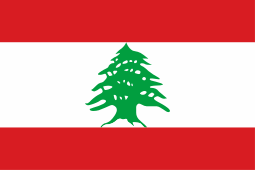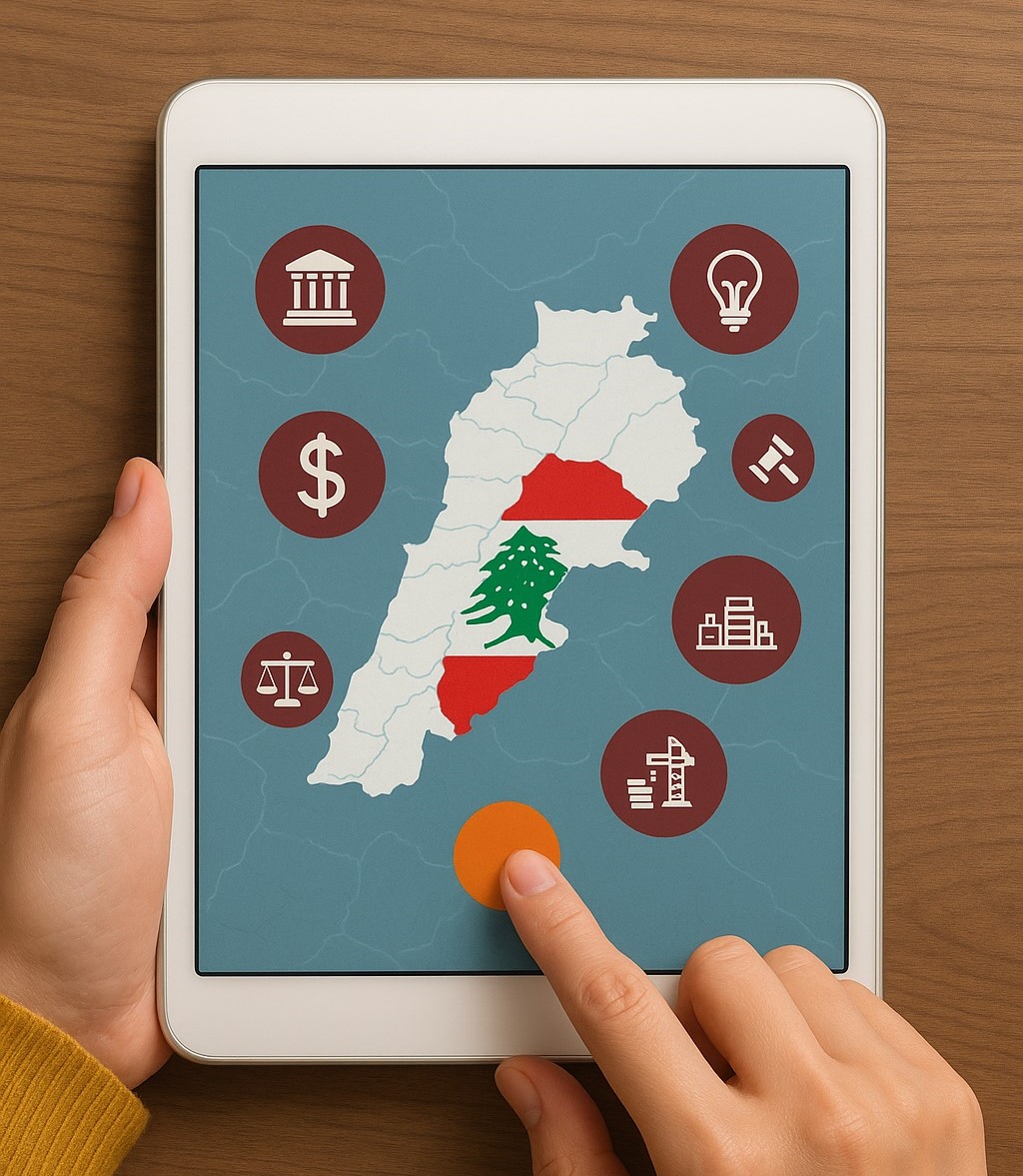Accelerating Urgent Reforms
Lebanon is at a pivotal moment where meaningful reform can no longer wait. REHUB highlights the status of key reform efforts and sheds light on what still needs to be done. Using open and official sources, the platform amplifies the voices of civil society, public institutions and other stakeholders to track progress and push for action. By making reform efforts visible and accessible, REHUB helps turn commitments into measurable change.
| Mapping Reform in Lebanon
Lebanon Reform Implementation Matrix (August 2025)Below is a comprehensive matrix of key reform commitments across sectors in Lebanon, with implementation indicators, responsible stakeholders, legal instruments, timelines/benchmarks, and source references from official documents. Methodology for Reform Tracker Development Each reform tracker was developed through a rigorous desk-based methodology combining official policy review, results-based monitoring principles, and source triangulation. We systematically analyzed primary legal texts, government decisions, donor progress reports, and verified media releases from 2022–2025. Reform actions were mapped against responsible institutions, legal instruments, and time-bound milestones, ensuring accountability and traceability. Status updates and bottlenecks were drawn from sector-specific strategies (e.g. NSPS, Law 244/2021), ministerial statements, and third-party evaluations (e.g. World Bank, UNDP, IMF). No extrapolation or assumptions were made, only verifiable actions and publicly documented steps were included. All trackers follow a unified matrix structure to ensure comparability, accuracy, and usability across sectors. As information was often fragmented across platforms, multiple sources...
Read More| Governmental Reform Efforts and 3RF
Through the combination of a nationwide survey of 1,201 respondents and 18 focus group sessions totaling 111 civil society organizations (CSOs), this report examines: 1) public perceptions regarding aspects of the port blast and the economic crisis, as well as on recovery, reform, and reconstruction; and 2) CSO assessments on the experience of what is known as the Lebanon Reform, Recovery, and Reconstruction Framework (3RF), to help inform recommendations for improvement and lessons learned for the nationwide expansion of the 3RF.Full Report
Read MoreAs part of its advocacy efforts towards building a people-centered and sustainable recovery from the Beirut port explosion and its endeavors to promote inclusive and equitable social justice, as well as foster trust between individuals, entities, and the Lebanese government, the Lebanese Center for Policy Studies (LCPS) partnered with Transparency International (TI) and its local chapter, Transparency International Lebanon – No Corruption, to issue “The Reform Monitor.” The topics covered by the monitor are linked to the areas of reform, recovery, and reconstruction (3RF). The monitor falls within the Building Integrity and National Accountability in Lebanon (BINA’) project, which is funded by the European Union. At the end of December 2022, the overall framework was reviewed for evaluation and adaptation purposes based on the closeout of the first phase, with foreseen updates underway. The views expressed in the monitor do not necessarily reflect those of the donor.Reform MonitorLinkExplaining the 3RF in the Wake of the Beirut Blasthttps://www.lcps-lebanon.org/en/articles/details/4774/explaining-the-3rf-in-the-wake-of-the-beirut-blastThe National Anti-Corruption Commission (NACC) and Curbing Rampant Corruption in Lebanonhttps://www.lcps-lebanon.org/en/articles/details/4793/the-national-anti-corruption-commission-(nacc)-and-curbing-rampant-corruption-in-lebanonThe Implementation of the 2020 Law on Illicit Enrichment: Challenges and Opportunitieshttps://www.lcps-lebanon.org/en/articles/details/4815/the-implementation-of-the-2020-law-on-illicit-enrichment-challenges-and-opportunitiesAccess to Information in Lebanon: The Law and Its Implementationhttps://www.lcps-lebanon.org/en/articles/details/4833/access-to-information-in-lebanon-the-law-and-its-implementationRegulating the Energy Transition: Lebanon’s New Law on Distributed Renewable Energyhttps://www.lcps-lebanon.org/en/articles/details/4853/monitor-%7C-regulating-the-energy-transition-lebanon%E2%80%99s-new-law-on-distributed-renewable-energyThe National Human Rights Commission: Prospects and Challengeshttps://www.lcps-lebanon.org/en/articles/details/4873/monitor-%7C-the-national-human-rights-commission-prospects-and-challengesProtecting Beirut’s Heritage Buildingshttps://www.lcps-lebanon.org/en/articles/details/4877/reform-monitor-%7C-protecting-beirut%E2%80%99s-heritage-buildingsStatus Review of Disability Rights in Lebanonhttps://www.lcps-lebanon.org/en/articles/details/4879/reform-monitor-%7C-status-review-of-disability-rights-in-lebanonLebanon’s Price Subsidies Systemhttps://www.lcps-lebanon.org/en/articles/details/4882/lebanon%E2%80%99s-price-subsidies-systemSyrian Refugees in Lebanon: Legal Challenges for Municipalitieshttps://www.lcps-lebanon.org/en/articles/details/4884/monitor-%7C-syrian-refugees-in-lebanon-legal-challenges-for-municipalitiesReforming Municipal Elections in Lebanon: Pathways to Democratic Local Governancehttps://www.lcps-lebanon.org/en/articles/details/4888/reforming-municipal-elections-in-lebanon-pathways-to-democratic-local-governanceEducation in Times of Emergency in Lebanon: Improvised Solutions and Missed Opportunitieshttps://www.lcps-lebanon.org/en/articles/details/4896/education-in-times-of-emergency-in-lebanon-improvised-solutions-and-missed-opportunitiesAssessing the Compliance of Lebanese Ministries with the Access to Information Lawhttps://www.lcps-lebanon.org/en/articles/details/4890/monitor-%7C-assessing-the-compliance-of-lebanese-ministries-with-the-access-to-information-lawManagement of Construction Demolition Waste in Lebanonhttps://www.lcps-lebanon.org/en/articles/details/4905/management-of-construction-demolition-waste-in-lebanonStrengthening Protections: An Analysis of Violence Against Women Legislation in Lebanonhttps://www.lcps-lebanon.org/en/articles/details/4914/strengthening-protections-an-analysis-of-violence-against-women-legislation-in-lebanonGovernance of Aid in Times of Crisishttps://www.lcps-lebanon.org/en/articles/details/4938/governance-of-aid-in-times-of-crisisStrengthening Whistleblower Protection: A Key to Accountability in Lebanonhttps://www.lcps-lebanon.org/en/articles/details/4942/strengthening-whistleblower-protection-a-key-to-accountability-in-lebanonVoices Under Siege: Monitoring Freedom of Speech in Lebanonhttps://www.lcps-lebanon.org/en/articles/details/4968/voices-under-siege-monitoring-freedom-of-speech-in-lebanonLiving with Inequality: An Overview of LGBTQIA+ Rights in Lebanonhttps://www.lcps-lebanon.org/en/articles/details/4973/living-with-inequality-an-overview-of-lgbtqia--rights-in-lebanonLebanon’s Rental Law and the Housing Crisishttps://www.lcps-lebanon.org/en/articles/details/4977/lebanon%E2%80%99s-rental-law-and-the-housing-crisisAdministrative Decentralization in Lebanon: Opportunity for Reform or Risk of Fragmentation?https://www.lcps-lebanon.org/en/articles/details/4981/administrative-decentralization-in-lebanon-opportunity-for-reform-or-risk-of-fragmentation
Read MoreRubble Removal and Reconstruction Reform Tracker[1] Reform Area: Rubble Removal and Reconstruction Last Updated: November 2025 Citizen Impact Summary Dimension Snapshot Source Who Is Affected? Over 100,000 residents displaced, 53,000 housing units fully destroyed, 127,000 severely damaged, and 317,000 partially damaged; entire southern border villages (e.g., Houla, Aita al-Shaab, Ramiyeh) saw 70–90% destruction. Public schools, municipal buildings, health centers, and water/electric networks are non-functional. CDW Policy Brief (AUB Nature Center, Nov. 2024); UN Debris Taskforce Statement (May 2025); Council of the South, “An-Nahar”, 20 April 2025; World Bank RDNA 2025; Mohammad Chamseddine interview, Manaaṭeq Net; Financial Burden? Total damage: ~$11 billion; housing: $7B, infrastructure: $1B, rubble removal: $35M; WB approved $250M (loan/grant mix), covering
Read MoreBe Engaged, Join the Movement
Become a part of Lebanon’s reform efforts and stay informed about the latest developments. Together, we can build a transparent and accountable future for Lebanon. Active participation from civil society, the private sector, and citizens is vital for successful reform. By staying updated and engaged on the ongoing national and local reforms - including 3RF, you help ensure continues progress. Engage with reform efforts across various sectors to support Lebanon’s recovery and drive meaningful change.
| Civil Society Reform Advocacies
Explore the key initiatives undertaken by civil society organizations to advocate for transparency, ensure public accountability, and strengthen civic engagement across Lebanon.
SummaryThe degradation of Lebanon’s natural environment over the past decades is a testament to governance failures in the sector. This degradation not only affects the country’s landscapes but has also had severe economic and public health consequences for its population such as the widespread pollution of rivers like the Litani due to untreated wastewater, the depletion of groundwater reserves in regions like the Bekaa Valley, and the proliferation of unregulated quarries in areas such as Chekka and Chouf, which have caused deforestation, habitat loss, and air pollution.The recent crises Lebanon has grappled with from political conflict and instability to financial collapse have further exacerbated environmental degradation. The weakening of government institutions has led to reduced oversight and enforcement, allowing violations to go unchecked. For instance, the energy crisis has driven reliance on private generator operators, many of whom operate illegally and dangerously, contributing to air pollution and public safety risks. These overlapping crises have also weakened critical infrastructure, including waste management and water treatment systems. On top of this, the escalating impacts of climate change rising temperatures, prolonged droughts, and extreme weather events continue to place immense pressure on already fragile ecosystems.Of these series of shocks, the 2024 war also had a heavy toll on Lebanon’s environment, one that continues to threaten citizens’ well-being well beyond the ceasefire. Destruction of infrastructure, pollution of natural resources, deforestation, and possible use of chemical agents have created long-term environmental hazards. Recovery from the 2024 war cannot be achieved without restoring the damaged ecosystems and rebuilding critical environmental infrastructure. One of the most pressing and lasting threats is the vast quantity of construction and demolition waste (CDW), mounting to millions of tons now scattered across decentralized locations. Yet within this crisis lies an opportunity: if managed strategically, this rubble can be recycled and reintegrated into Lebanon’s reconstruction efforts, reducing environmental harm and creating economic value. For this opportunity to be realized, coordinated action is needed across government, civil society, and the private sector. Enabling policies, technical capacity, and investment in recycling infrastructure are essential to transition from waste to resource.The AUB Nature Conservation Centre (NCC) is actively addressing this challenge through advocating for the recycling of CDW, engaging key stakeholders, mapping national policies, and benchmarking against international policies and frameworks. NCC is also piloting sustainable recycling methods and pushing for policy frameworks that support environmentally responsible reconstruction. At its core, NCC’s work is rooted in restoring nature while fostering community resilience and driving economic recovery.Effort OverviewQuestionDetailsWhat was the reform challenge?Absence of a national framework for CDW management, widespread illegal dumping, lack of coordination among key stakeholders, weak, fragmented policies and lack of data and accessibility. What was the civic strategy or action taken?Our strategy focuses on engagement, inclusion, and evidence-based action by partnering with expert faculty members at AUB who specialize in CDW management and recycling. Together, we built on existing research, analyzed relevant policies, gathered international benchmarks, and submitted formal policy recommendations. We also published a policy brief, coordinated efforts through policy dialogues, launched an advocacy campaign calling for CDW recycling, and initiated consultations with key stakeholders from civil society, the public and private sectors, and both national and international institutions.What agencies were targeted?The initiative was launched in partnership with the Ministry of Environment. Other targeted agencies included civil society organizations and non-governmental organizations, public sector institutions, private sector entities and lobby groups, academic institutions, and the international community such as INGOs, embassies, and UN agencies.What reform priorities does it relate to?Waste Management Policies; Access to Information & Data; Transparency and Accountability for Environmental Destruction; CDW Management; Circular Economy and Recycling Targets all of which fall under the 3RF pillars. Key Partners & Coalition MembersTypeName(s)Lead CSONature Conservation Centre at the American University of Beirut (AUB- NCC)Supporting CSOsRestart; LHDF; LLWB; Save the children; LRI; REEF; Aman; Green peace; Arcenciel; Al Majmoua; Transparency International Lebanon; Institute of Environment Balamand; Jibal; Council of Environment Kobayat, Biodiversity Conservation Initiative, AUB ESDU, AUB SAIL, Plastc lab; Y4G; Adyan. Progress SnapshotIndicatorValueCommentsCSO Partners20 Stakeholder Meetings Conducted41 Launching Advocacy Campaign9 Article features, 1 TV Appearance, 1 Podcast, 12 Social Media Posts Published Policy Brief 1 Accessible in English and Arabic Pictures AUB Delegation Meeting with Former Minister of Environment Dr. Nasser Yassin. AUB-NCC Meeting with Former Prime Minister Najib Mikati to Propose Sustainable Post-Crisis CDW Management Solutions. Former Minister of Environment Dr. Nasser Yassin mentioned AUB-NCC’s policy brief on national TV, raising awareness about CDW management. A multi-stakeholder coordination meeting at AUB on March 20, 2025, to align on CDW recycling and discuss related opportunities and threats. AUB delegation meeting with the Spanish Embassy, with AUB-NCC as part of the delegation, to discuss CDW management in Lebanon. Results Achievement Sources Enhanced understanding of the CDW management landscape by identifying new opportunities for sustainable practices and system improvements, while supporting reform planning through evidence-based research to assist the government in implementing effective policy changes. Policy Brief: EN - AR Ongoing research and development will be disseminated once finalized Raised public and institutional awareness on critical waste management issues through targeted outreach and communication efforts. AUB-NCC Social Media Platforms: Instagram, LinkedIn , X Relevant articles can be found in the Resources and Annex section. Built consensus on CDW management priorities, aligning diverse stakeholders around recycling CDW through actionable solutions and policy directions. CDW Coordination Workshop Report: EN - AR Proposed a CDW recycling model based on desk research, Key inform interviews (KIIs) and policy dialogues done with various stakeholders. From Waste to Value: A policy approach to establish a recycling industry for Lebanon's construction and demolition waste: EN Challenges Faced and Call to ActionChallengeSolution(s)Lack of Data and AccessibilityAdvocate for data sharing and accessibility, and emphasize the importance of systematic data collection by lobbying responsible entities to gather and report data in support of transparency, informed decision-making, and research.Weak, Fragmented PoliciesConduct a policy review and submit recommended legal amendments, alongside the engagement of relevant government stakeholders.Lack of Coordination Among Key StakeholdersEstablish a multi-stakeholder CDW management taskforce, with representatives from: ministries, municipalities, private sector, NGOs, and academia.This body would coordinate actions, share data, and guide implementation of the national strategy.Widespread Illegal DumpingImplement strict enforcement mechanisms and incentives, including strengthening environmental monitoring and penalties for illegal dumping. Absence of a National Framework for CDW ManagementSet clear standards for collection, sorting, recycling, and disposal, including legal mandates for CDW separation at source, national recycling targets, integration into building codes and permits. Calls to ActionEmbed recycling of rubble into reconstruction aid and standardsAdopt long-term reforms to fully integrate CDW Recycling in the construction sectorSupport the government and municipalities in collecting data, enforcing EIAs & prevent ecological disastersRely on evidence & input from all stakeholders (Academia, Private Sector, Specialized NGOs, Local Communities, Municipalities)Disseminate findings around the feasibility of CDW recycling in Lebanon Annexes & ResourcesPolicy Brief: EN - ARFrom Waste to Value: A policy approach to establish a recycling industry for Lebanon's construction and demolition waste: ENCDW Coordination Workshop Report: EN - ARArticles #TypeOutletTitleLink1ArticleNew Lines Magazine Clearing Lebanon’s War RubbleLINK2Articleاللواء بعد المطامر.. «اللواء» تفتح ملف الروادم: حلول «ممكنة» أم أزمة بلا حول ولا قوة؟! LINK3ArticleNNAاختتام مشروع RE-MED لاعادة تدوير مخلفات البناء ياسين: سمح لنا بتنفيذ مشاريع تجريبية مع مختلف الشركاء والنقابات LINK4ArticleLCPSإدارة مخلّفات البناء والهدم في لبنان LINK 5ArticleLebanon Debateصعوبة في إزالة الأنقاض... لبنان يتعامل مع تدمير 3 آلاف مبنى بِبيروتLINK6ArticleAl Joumhouriaلبنان يواجه مهمّة ضخمة للتخلّص من الحطام الناتج من الحربLINK7ArticleNew York TimesLebanon Faces a Colossal Disposal Task: Clearing War DebrisLINK8PodcastThe MergeEpisode 1 | Issam Srour | Recycling War Rubble for a Sustianable FutureLINK9ArticleL’Orient Le JourMillions of tons of rubble: The hidden controversy of conflict zonesLINK10ArticleVertEntre 50 et 100 millions de tonnes de déchets : au Liban, l’impossible défi de la dépollution après la guerre avec IsraëlLINK Contact Point American University of Beirut, Nature Conservation Centre (AUB-NCC)Antoine Kallab, Associate Director, ak231@aub.edu.lb
Read MoreSummary:Himaya Daeem Aataa launched a campaign to combat corruption and promote transparency in local governance by strengthening the capacities of municipalities and empowering youth. The initiative addressed weak accountability and limited civic participation in decision-making. Through targeted training, youth engagement, and collaboration with municipal authorities, the campaign supported the development of local anti-corruption and transparency policies. It focused on enhancing good governance, increasing youth participation, and building sustainable accountability mechanisms at the local level.Reform Challenge:The campaign addressed the persistent lack of transparency and accountability in local governance, particularly within municipal institutions. Municipalities often operated with limited public oversight, weak institutional frameworks for anti-corruption, and minimal youth engagement in decision-making processes. These gaps undermined public trust and enabled misuse of public resources.Civic Strategy and Action Taken:Himaya Daeem Aataa launched a grassroots campaign to raise awareness about anti-corruption and transparency by:Building the capacities of municipalities on transparency standards, budget monitoring, and participatory governance tools.Empowering youth through training and mentorship programs to become active agents in promoting good governance and contributing to local policy development.Facilitating multi-stakeholder dialogues between youth, municipal officials, and civil society to co-develop localized anti-corruption and transparency frameworks.Agencies Targeted:Local municipal governments as primary implementers of governance reforms.Youth groups and community-based organizations (CBOs) as watchdogs and advocates.Civil society networks and media outlets to amplify messaging and sustain public pressure for reforms.Reform Priorities Addressed:Strengthening local governance by institutionalizing transparency and anti-corruption practices.Youth civic engagement and inclusion in policy-making processes.Enhancing accountability mechanisms within public institutions.Contributing to broader anti-corruption reforms aligned with national transparency and good governance agendas.
Read More
 EN
EN
 العربية
العربية

